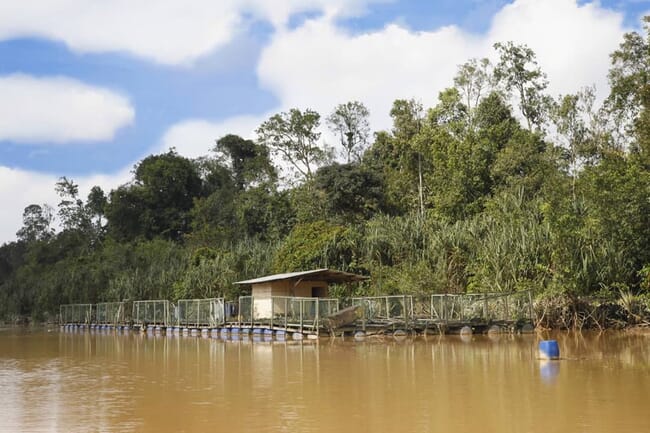
© Monash University
Malaysia is the ninth-largest shrimp exporter globally. The farming practice was introduced in the 1970s to meet the rising demand for shrimp supply, and today is one of the major contributors to the country’s GDP.
The main challenge to boosting shrimp production is the risk of disease transmission. Disease outbreaks diminish shrimp production and incur a massive financial burden on the stakeholders. Therefore, the control of disease becomes a priority if shrimp farming is to remain economically and ecologically sustainable.
According to researchers from Monash University Malaysia, many farmers have resorted to using unapproved antibiotics as preventive measures against infectious diseases, but this has led to the United States Food and Drug Administration (USFDA) banning, and red-listing several Malaysian exporters.
Bioprospecting and the mangrove forest
Bioprospecting is the search for plant and animal species from which medicinal drugs, biochemicals, and other commercially valuable materials can be obtained. There’s been an increasing interest in bioprospecting in recent years to combat the negative perceptions of Malaysia’s aquaculture industry.
“In the context of aquaculture, natural products can be introduced directly into the rearing water, integrated as a functional additive into the animal feed, or injected intramuscularly into the shrimps,” said Dr Goh Bey Hing, leader of the Biofunctional Molecule Exploratory Research Group (BMEX) at Monash University.
“They were applied primarily to alleviate the water quality, relieve stress, enhance resistance to diseases, stimulate appetite, and promote animal growth,” he added, in a press release.
Researchers from Monash are working on a novel “home-grown” probiotic product for local aquaculture applications.
The team is hoping to transform a potential probiotic strain isolated from the mangrove forest into a readily applicable biocontrol agent for shrimp farming. The probiotic strain selected is Streptomyces sp., a genus the team’s been working with for years.
According to Dr Goh, this innovation is inspired by observing the lack of disease occurrence in shrimp in their natural habitats. The exploration of the idea is funded by the Fundamental Research Grant Scheme (FRGS) from the Ministry of Education, Malaysia.
“Streptomyces sp. isolated from the mangrove floor is chosen for the project because the mangrove forest is a unique ecosystem that serves as the nursery site for many aquatic species,” said Dr Goh.
“The mangrove ground's fluctuating, complex and competitive ecology shapes the flourishing of a unique blend of the versatile microbial communities in the soil environment.
“It was hypothesised that there exists a symbiotic relationship between the soil microbiome and the animal. This microbial community plays a critical role in supporting the animals’ early development.”
Introducing the mangrove-derived Streptomyces sp. as probiotics for farming may potentially replicate the protective effect on shrimp larvae during cultivation.
The probiotics inhibited the growth of the pathogen Vibrio parahaemolyticus, the causative agent for acute hepatopancreatic necrosis disease (AHPND). The pilot study also revealed the significant growth-promoting effects of the probiotics in shrimps.

Skyfruit extract has been scientifically shown to exert an anti-infertility effect in fish and the findings are now being repurposed and trialled for application in promoting the shrimp hatchery process © Monash University
The second innovation involves the development of Malaysian folklore medicine skyfruit, more generally known as tunjuk langit in Malaysia. The limonoids-enriched extract has been scientifically shown to exert an anti-infertility effect in fish.
It was shown to enhance neurohormone regulation, and lead to an improvement in sperm production. The findings are now being repurposed and trialled for application in promoting the shrimp hatchery process.
“The natural product represents a safer, more sustainable and environmentally-friendly biocontrol agent for shrimp farming,” Dr Goh says.
“It could be an effective means to help enhance the quantity and quality of shrimps produced. Fostering the translational application of natural agents in shrimp farming in the local context is important.
“Intensifying the shrimp farming industry can help reduce dependence on the natural supply of shrimps and prawns, thus safeguarding sustainable food production and security.”
Further research and industrial collaborations are needed to reinvigorate the quest for suitable and effective natural products tailored to boost local shrimp farming.
